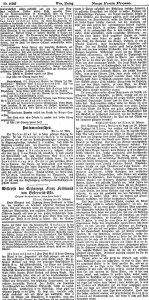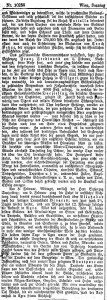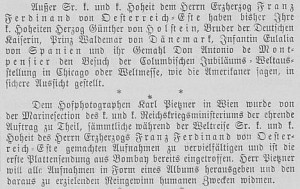In the morning, good news arrived. Tigers had killed multiple heads of cattle not far from the camp. Soon we were rushing to the meeting place on riding elephants, while our entourage followed on hunting elephants. The Nepalese riding elephants are saddled like horses and advance very quickly so that their use is much preferred especially on longer trips to the hunting elephants with their heaving haudas. Arrived at the hunting ground we had to wait for the confirmation of the tigers by the advance party of shikaris.
In the mean time, 200 elephants were assembled under the direction of young Jamshir. The huge thick-skins all in a row created an imposing sight. A the side of very old animals stood small, barely two-year-old elephants. One of the latter ones had taken up the role of clown and teased its companions without interruption and did all kinds of bad stuff. As further events would show, due to it being unaccustomed with hunting, it misbehaved much during the hunt, greeting each discovered head of game with a blow of its trumpet, sometimes reversed course and ran away until the blows by its driver compelled its return to duty. A young elephant with such a sunny disposition creates much hilarity by its funny movements of its huge mass. Only the difficulties of a long transport home made me abstain from buying one of these companions for my country.
After always 20 driver elephants was inserted a hauda elephant, for which purpose they used dignified old men who had participated in many animal fights and had shown a calm demeanor and fearlessness. Each of the driver elephants carries besides the mahaut also a man whose job it is to treat the animal with a wooden cudgel. The treatment of the elephants by its guardians was very unkind as even the slightest misbehavior or even just to change to a faster pace resulted in a beating that made blood flow down the sides of the elephants.
In the middle as well on the flanks of the long line of elephants, commanders took charge to keep the line intact. Furthermore, the head shikari was on patrol, giving his orders by marching up and down the line on a very fast elephant.
After a wait of half an hour, the shikaris sent out returned with the message that a tiger has been confirmed in a thick jungle. Quickly we climbed up into the haudas, the line of elephant turned to the left and marched quickly one after the other into the woods.
These woods contain mostly tall shala trees that are entwined by lianas thick as an arm and have a thick canopy of leaves overhead. The ground is covered in knee-high, very thick yellow grass which resembles our reeds. Some of the jungles have clearings where the grass is growing especially luxuriously and reaches such a height that one can just see over the top of it while standing the hauda. Obscured by such grass, the area is criss-crossed by torrents, clefts and pools. Game of all kind is finding safe cover there and constructs formal tunnels where it rests or sneakingly grazes and hunts. Here roam the tigers and panthers, from small predators such as the jackal, the small Indian civet (Viverricula malaccensis), the different mongeese; packs of wild boards burst out of swampy areas. Beautifully spotted chitals (Cervus axis), the Indian hog deer with its roebuck-like antlers and the red-brown muntjac (Cervulus muntjac) are found here, while the mighty swamp deer or barasinga (Cervus duvauceli) and the sambar deer are rarely seen. The porcupine builds its long-winded burrow; sometimes there are hispid hares (Lepus hispidus) which resemble guinea pigs and the common Indian hare.
Among the birds, one can observe peacocks most frequently which are here not considered holy and may be shot, as well as francolins, the very rare swamp francolin (Francolinus gularis) and the beautiful Bankiva hen, usually called common red jungle fowl (Gallus ferrugineus) from which our house chickens descend. On many barren trees sit various kinds of eagles, vultures and falcons while nosy crows and common ravens with hoarse cries circle the place where a dying or killed animal is lying. Sometimes, one meets a gray hornbill (Ocyceros birostris), a yellow oriole with black head (Oriolus melanocephalus), a gorgeous scarlet minivet (Pericrocotus speciosus), as well as various colorful woodpeckers; among the pigeons, it is especially the splendid common emerald dove (Chalcophaps indica) with its metallic green and violet feathers that attracts our attention; timid owls with silent wing strokes rush out of holes in the trees; from all sides are heard the cries of the parrots. Monkeys which are very common in Nepal we are not allowed to shoot as the natives consider them holy.
We might have ridden about one and a half kilometers in silence one after the other, when suddenly the head shikari sent one part of the elephants and shooters towards the right, the other towards the left and had us quickly form a circle so that the clearing where we were was surrounded by an impenetrable ring of elephants. In the middle of the clearing stood two meter high thick cane brake and grass. As the circle had a diameter of under 80 m, we who were not used to this kind of hunting doubted how a tiger could be kept in such a small place or even confirmed after all the noise caused by the set-up of the circle. Soon I would be proved wrong.
When the circle had closed, three shikaris on especially reliable elephants rode into the thick grass. After a while, one of the elephants, trumpeted loudly and jumped forward with a raised trunk and extended ears, a clear sign that it had met a tiger. Soon I saw the top of the grass move but only weakly as if a snake or a small animal was moving on the ground — no doubt, a tiger was in the circle. Our attention was strained to the utmost.
Without interruption, the shikaris rode around in the jungle; every moment, one of the elephants trumpeted; the top of the grass moved soon here, soon there, sometimes very close — but I couldn’t see the tiger.
After almost a quarter of an hour of extreme tension for all shooters, during which the elephants were closing in, the tiger finally tried to break out of the circle by lunging towards the resident with a huge roar. Driven back by the shouting of the elephant drivers, the tiger ran in full flight past about 20 elephants and was on the verge of returning into the thick grass cover when I fired. The resident and my hunter had seen the tiger fall after my shot but I was not completely sure as there had been only one tiger confirmed but consul general Stockinger, on the opposite side, soon fired multiple shots into the thicket. Now Crawford and Prónay fired as well; furthermore, a shikari reported that the tiger I had shot was dying at the location of the shooting: thus, there had to be multiple tigers in the circle.
In reality, all order was soon broken. Multiple gentlemen got too excited and stormed in instead of staying at their position as ordered and what was part of the practice. The elephant drivers incited to rush entered the circle where a rapid fire started on everything that moved. Like my neighbor, I had in the beginning waited for the shooters to return to their camp. When we saw that they wouldn’t return, we followed their example and did likewise. After a few steps of my elephant into the high grass, a tiger jumped up in a more cleared spot. I shot. At this moment I see a second tiger emerge from a tunnel of reeds, shouted »rok« and fired. To my joy, this tiger lay dying in front of me too.
Finally, the rapid fire ended. Each of the gentlemen who had ridden into the circle at the beginning claimed to have shot a tiger. One shooter even claimed to have killed three tigers. I dismounted from the elephant to examine first the two tigers that I had shot so quickly in the grass. Unfortunately, both tigers also were caught in the concentric massive fire, one of which was shot in the rear leg and the other had two hits in the gaskin. The first animal bagged, a capital tigress, luckily only had the one hit by me which made the cat collapse.
There on the spot lay, besides the old tigress, also three almost adult tigers, apparently born last year. From the latter ones one was attributed to Captain Fairholme while arbitration awarded one of the two tigers which I had wounded to consul general Stockinger and the other to Prónay as the wound from the rear leg was caused by an expansive gun bullet which was only used by Prónay.
The division of the spoils was not so simple, as some of the gentlemen had, in the heat of the battle and the stress of a tiger hunt, fired a lot of shots. The total result of four tigers could have been larger by one, by the way, if we had bagged the tiger the natives claimed to have fled when the hunting circle had been relaxed allowing the fifth tiger to escape in the high grass. In any case, the beginning of the Nepalese expedition had proved fruitful and filled us with pleasure, shared with the natives wo greeted us with not faked „selams“.
The resident ordered the hunt to continue. Soon a new circle had been closed in which the shikaris suspected a strong male tiger that had been troubling the area for quite some time. This assumption was wrong, however. Only a few beautiful jungle hens rose in terror and above our heads flew a hornbill with a white body and black yellow bands on its wings of rare size. It was part of a species I did not know.
The shikaris did not give up hope and went to look out with their elephants, while we ate breakfast. Near the jungle site where we just had hunted we selected a place in the shade under a large shala tree and enjoyed our food until the cry „Bagh, Bagh“ (tiger) rang out. We jumped up and mounted our elephants as quickly as possible which were close by. I had just returned to my hauda when my mahaut pointed at the moving grass tops close to the spot where I had sat and whispered that a tiger was there. This seemed incredible to me as we had passed that spot during the closing of the second circle even though we were spaced out at a distance and had eaten breakfast only 20 paces away and talked loudly and laughed; I had even shot a jungle hen from there. And still it was just as the mahaut had said.
The most skillful and inventive natives closed the circle quickly with their elephants around the small grass bush, I entered and at the same moment a tiger jumped up to the right of me. I fired a shot at it while it was fleeing and started to attack a number of elephants of the circle who turned around trumpeting and snorting and made loud noises. After a few seconds, the tiger emerged again out of the grass into a small clearing where it was killed by Clam with a hit to the chest.
A number of shots were fired on the dying tiger, a terrible custom here which I do not approve as it casts doubt to whom the kill belongs and also because the large caliber guns that the English use destroy the beautiful skin. Mostly, however, because it is not proper for a hunter. But other customs govern hunting in India than at home. The difference is about that one between the views of a sportsman and a dedicated hunter.
Among the natives it was said that the last tiger, a strong male, was not identical with that which I had shot but that this one had escaped with a shot through the chin after he had attacked an elephant. I did not agree and believe to have missed the tiger in the high grass.
Happy about the bagged five tigers — a result in such a short time and under so remarkable circumstances probably seldom achieved — we ventured towards the camp. During the march we tried a large hunt, a so called „general shooting“, where all elephants form a line in the jungle and every kind of game is fair game. Such a general shooting is very exciting as the hunter has to prepare himself for various game: soon there are wild boars, soon jackals, soon a small Indian civet, soon deer, peacocks or francolins and jungle hens which flee from the elephants or fly away. All along the line, shots rang out. One could distinguish shot from bullets by their sound and one could about guess what the neighbor had been shooting at. Our result was 51 pieces. I personally bagged two boars, multiple chitals, peacocks, francolins and a black-breasted Bengal bustard (Sypheotides bengalensis), which is in size between a dwarf bustard and our large bustard.
We spent the evening in the middle of the camp in a small dining tent in excellent mood, talking about the day’s events of the hunt.
Links
- Location: Dakna Bagh, Nepal
- ANNO – on 09.03.1893 in Austria’s newspapers.
- The k.u.k. Hof-Burgtheater plays “Freund Fritz“ (a replacement for „Faust“), while the k.u.k. Hof-Operntheater is performing the opera „Merlin“.



